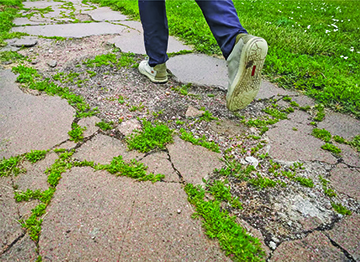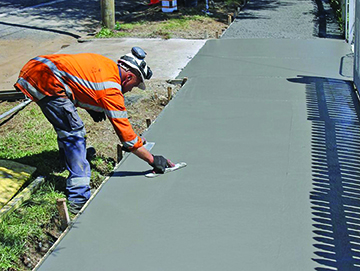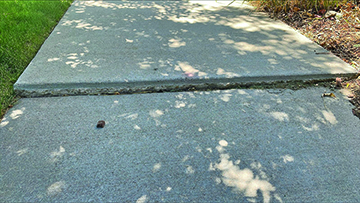You Don’t Own Sidewalks At Homes, Businesses, But City Set To Charge You $150 Per Year For Repairs
by Glen Richardson

Stumbling Steps: Denver residents have stumbled along with broken sidewalks for years. Now the city will begin to fix them.
The Mile High City has found a fast path to get back on its feet. After stumbling along with broken sidewalks for years, this year the city is starting to charge homes and businesses $150 per year to fix sidewalks, “Unfortunately,” Denver admits, “there are many sidewalks in need of repair and about 40% of our sidewalk network is either missing or too narrow.”
The fee applies to all property types, both housing and stores. Moreover, the city says property owners who don’t have a sidewalk along their property will still have to pay the fee.
Additional charges — yet to be determined — will be added to properties with significantly more sidewalk frontage than the average property owner. The latest changes also mean property owners who live on private streets will be charged fees, even though they will continue to be responsible for their own upkeep.
All Properties Fee
Voter approved in November 2022, the city will use the fee to repair hazardous sidewalks, reconstruct sidewalks that are deficient, and build sidewalks where they’re missing.
“Since everyone benefits from a complete sidewalk network,” city officials declared in a controversial decision that all Denver
property owners will have to pay the fee.
The $150 per year fee — that the city says could increase due to inflation — will be split into two payments, with each half appe

Sidewalk Supervisor: Newly appointed Department of Transportation & Infrastructure (DOTI) appointee Amy Ford will direct sidewalk work.
aring on the property owner’s bi-annual stormwater bill. The average annual cost for sidewalk maintenance per capita in other major U.S. cities is between $30 and $60.
$40 Million Per Year
“Ordinance 307 will begin to fix or build functional sidewalks for the 40% of the city’s streets that are missing them,” according to Denver’s Department of Transportation & Infrastructure or DOTI.
DOTI — headed by Amy Ford, a Dallas consulting firm appointment of Mayor Mike Johnston — estimates the fee will bring in $40 million a year for sidewalks. The ordinance says the work should be done in nine years, but the city can take longer if that’s not possible. Back in 2022, the city estimated it could take nearly 30 years.
Most other cities charge for sidewalks by requiring property owners to pay a fee based on the linear footage of sidewalk directly in front of their property, meaning they are essentially charg

Paving The Way: The City of Denver is set to begin charging homes and businesses $150 per year to fix sidewalks.
ed per foot of sidewalk they are responsible for maintaining.
Large Lots Extra
Properties that have more than 230 feet of street bordering their property, such as those with corner-lots, will be charged an additional $3.50 per foot over 230 feet. At locations where sidewalks don’t currently exist, property owners will pay either the flat fee or flat fee with impact fee, based on the length of the public right of way where a future sidewalk will be constructed.
While the program’s original language called for the city to get the job done in nine years, part of the changes approved recognized that might not be possible, expanding the timeline to “soon thereafter.”
A city analysis in 1922 estimated Denver sidewalks would cost $2.8 to $7.3 billion, far more than the $40 million the city says it

Filling The Gap: Fixing or eliminating gaps in sidewalks improves the safety and comfort for pedestrians, cyclists, and other users.
will cost in 2025.
Rebates Obtainable
The sidewalk program also provides a way for property owners to apply for a rebate on their sidewalk fee based on income and household size.
Property owners already receiving the city’s instant rebate for solid waste management services will automatically receive the sidewalk rebate and will not need to re-apply.
More: Now homeowners only have to fill out one application to determine their eligibility for DOTI’s Solid Waste Service Rebate and Sidewalk Program Rebate. Trash rebate participants who receive a stormwater bill will automatically receive the sidewalk rebate.
Two Payments Yearly
The fee will appear on municipal stormwater bills. It will be divided into two payments for the first and second half of the year.
Whether a homeowner’s block has

Closed For Overhaul: With about 40% of Denver’s sidewalks either missing or too narrow, residents will see a lot of this sign. Photo by Hart Van Danburg
proper sidewalks or not, property owners have to pay. Even if they don’t have a sidewalk along their property, they still have to pay. If they have a homeowner’s association that handles their stormwater bills, the HOA would handle the fee.
The program will build sidewalks to the current city standard. If a district has existing decorative or beyond-standard sidewalks, the city will repair or repave the sidewalk to city standard, but not to the district’s beyond-standard sidewalk. Any changes to the district’s assessment to reflect a decreased need for sidewalk funding as a portion of their assessment would need to be handled according to the district’s budgetary rules.
Citizen Damage Reports
While DOTI says it stands up for the city’s new sidewalk program, people will be able to report major sidewalk damage on Denver’s Online Services Hub. DOTI will inspect and triage reports received and those that meet certain criteria will be placed on a spot repair program. Examples of sidewalk issues that may be addressed in the spot repair program include: a) Adjoining sections of sidewalk with an elevation difference greater than one inch; b) Adjoining sections of sidewalk with gaps greater than one inch; and c) Extensive raveling and major breaking.
Large properties — including Denver’s Department of Parks & Recreation and other government entities with big tracts of land — could face significantly higher bills if they have more than 230 linear feet of sidewalk running along their lots.
Once money starts flowing in from fees, DOTI will hire a concrete contractor to start making repairs. It will also hire a consultant to create a sidewalk master plan. All of that is mandated in the original law voters approved. Once fully built out, Denver’s sidewalk network will be approximately 3,489 miles, or about the distance from Denver to New York City and back again!
